
A World War I-era interracial love story seen through a 1960s Civil Rights Movement lens gets revived for 21st Century audiences as The Antaeus Company presents Alice Childress’s Wedding Band: A Love/Hate Story In Black And White, a compelling, thought-provoking look at how things were, how they have changed, and how much remains the same.
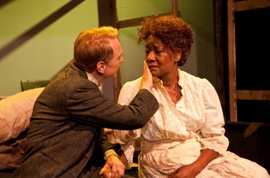 Julia (Veralyn Jones) and Herman (John Prosky) have been “Black And White” lovers as of ten years ago today, though Julia’s new neighbors remain as yet unaware of the seamstress’s against-the-law relationship, Julia having long ago learned that the truth could in fact do quite the opposite of setting Herman and her free.
Julia (Veralyn Jones) and Herman (John Prosky) have been “Black And White” lovers as of ten years ago today, though Julia’s new neighbors remain as yet unaware of the seamstress’s against-the-law relationship, Julia having long ago learned that the truth could in fact do quite the opposite of setting Herman and her free.
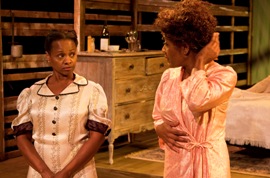 A microcosm of 1918 African-American South Carolina, Julia’s new neighborhood is peopled by, among others, her landlady Fanny (Karen Malina White), proud of a property-owner status that allows her to “represent her race in an approved manner,” i.e. on terms set by her Caucasian not-so-next-door neighbors; Mattie (Nadège August), an illiterate young mother forbidden to marry her common-law spouse October, given that divorce, even from a wife-beating first husband, was still illegal in South Carolina; and Lula (Peggy Ann Bow), the adoptive mother of WWI soldier Nelson (Amad Jackson), home for a brief leave before being shipped off to Europe.
A microcosm of 1918 African-American South Carolina, Julia’s new neighborhood is peopled by, among others, her landlady Fanny (Karen Malina White), proud of a property-owner status that allows her to “represent her race in an approved manner,” i.e. on terms set by her Caucasian not-so-next-door neighbors; Mattie (Nadège August), an illiterate young mother forbidden to marry her common-law spouse October, given that divorce, even from a wife-beating first husband, was still illegal in South Carolina; and Lula (Peggy Ann Bow), the adoptive mother of WWI soldier Nelson (Amad Jackson), home for a brief leave before being shipped off to Europe.
With Herman headed on over for a 10th-anniversary celebratory visit, Julia has no choice but to reveal the truth about her relationship to her neighbors, though even her insistence that “the way you and your husband feel, that’s the way it is with me and Herman. We love each other. That’s all, we just love each other” leaves her black neighbors no more willing to accept Herman’s and her interracial love than his family or the white community as a whole.
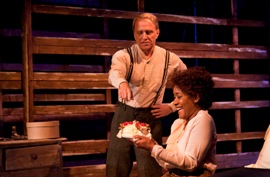 And so Herman and Julia dream of a move up north and the new life the baker has promised his longtime love once the $3000 debt he owes his mother gets paid off, though truth be told, the couple seem no closer to departure on their tenth anniversary than they were a decade ago. Worse still, though marriage would be a legal option in New York, their relationship, even sanctioned by Northern law, would be hardly more accepted there than in the Deep South.
And so Herman and Julia dream of a move up north and the new life the baker has promised his longtime love once the $3000 debt he owes his mother gets paid off, though truth be told, the couple seem no closer to departure on their tenth anniversary than they were a decade ago. Worse still, though marriage would be a legal option in New York, their relationship, even sanctioned by Northern law, would be hardly more accepted there than in the Deep South.
Unfortunately for Julia and her beau, any immediate plans to head north are put on hold by a life-threatening illness and the ensuing arrival on Julia’s doorstep of Herman’s sister Annabelle (Belen Greene) and his mother Thelma (Lynn Milgrim), each with her own set of problems, most particularly a secret whose revelation could make both mother and daughter the victims of their own brand of WWI-related racism.
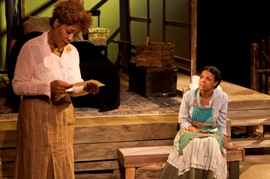 Playwright Childress wrote Wedding Band in 1962, but no New York theater would touch it until Joe Papp’s Public staged it ten years later with Ruby Dee as Julia and James Broderick as Herman. Times might have changed since 1918, but interracial marriage remained illegal in seventeen states as recently as 1967 and broader-reaching Jim Crow laws stayed on the books in the Deep South till the mid-‘60s as well.
Playwright Childress wrote Wedding Band in 1962, but no New York theater would touch it until Joe Papp’s Public staged it ten years later with Ruby Dee as Julia and James Broderick as Herman. Times might have changed since 1918, but interracial marriage remained illegal in seventeen states as recently as 1967 and broader-reaching Jim Crow laws stayed on the books in the Deep South till the mid-‘60s as well.
Even in today’s America, where the briefest glance at recent headlines reveals racism still alive and well and thriving, Wedding Band seems not a tad dated, particularly as brought to thrilling life by the Antaeus company members and guest artists who make up its “Honey Bunches” cast. (A second cast, the “Sweet Potatoes,” will be reviewed in two weeks, this being the latest instance of Antaeus “partner casting,” which allows theatergoers to see two very different acting ensembles, and “Dear Hearts” blends on Thursdays and Fridays.)
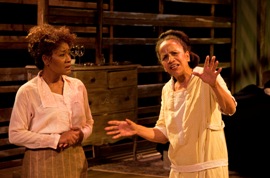 Under Gregg T. Daniel’s inspired direction, Childress’s theatrical chef-d’oeuvre gets the production it so richly deserves, one sparked by eleven couldn’t-be-better performances.
Under Gregg T. Daniel’s inspired direction, Childress’s theatrical chef-d’oeuvre gets the production it so richly deserves, one sparked by eleven couldn’t-be-better performances.
It helps that Childress has created a castful of multihued characters, no racial pun intended. Even the most “villainous” among them is as much victim as victimizer, whether snooty landlady Fanny, simply doing her best to climb the ladder of success in a hostile world, or Annabelle, unable to marry the man of her dreams till Herman ties the legal knot with a racially appropriate spouse, or Mattie, whose threats of a “whippin’” are the result of a mother’s attempts at day-to-day survival with hardly a penny to her name let alone a quarter, or even Thelma, herself the victim of prejudice and a particularly hard-luck life.
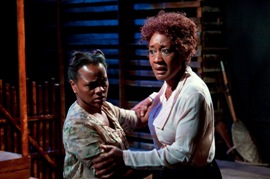 As the redoubtable Julia, leading lady Jones commands the stage with all the power of a Medea or a Jocasta, offering Antaeus audiences as powerful and richly-layered a performance as they will see anytime soon, and she is matched by her fellow Honey Bunches.
As the redoubtable Julia, leading lady Jones commands the stage with all the power of a Medea or a Jocasta, offering Antaeus audiences as powerful and richly-layered a performance as they will see anytime soon, and she is matched by her fellow Honey Bunches.
Antaeus Company treasures Prosky and Milgrin do some of their finest work to date as Julia’s titular adversaries in this “Love/Hate Story In Black And White,” Prosky’s mix of the heroic and the craven making it easy to love/hate his Herman, a decent yet flawed human being doing his best to find happiness in a hostile world, while Milgrim’s dithery persona serves Thelma/Frieda well, making her emotionally violent, racial epithet-filled knock-down drag-out with an equally venomous Jones even more of a show-stopper.
Blow’s tangy Lula, August’s feisty Mattie, and White’s fiery Fanny are all three simply delicious creations while a splendid Greene lets us see the frustrated Annabelle in all her complexities.
As for the menfolk, Jackson’s terrific Nelson displays leading man sex appeal and acting chops in equal measure and Buck Zachary delivers dynamic goods as the slimy peddler known only as The Bell Man.
Child performers Mma-Syrai Alek and Jasmine St. Clair could not be more adorable as Mattie’s daughter Teeta and as Princess, the white girl she babysits.
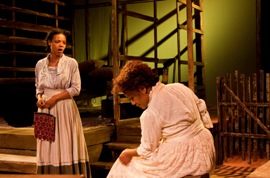 Not surprisingly, Wedding Band benefits enormously from an absolutely stunning Antaeus Company production design. Scenic designer François-Pierre Couture gives us Julia’s immediate neighborhood, both indoors and out, in all its ramshackle age and disrepair, and has been spectacularly lit by lighting designer Michael Gend. Costume designer A. Jeffrey Schoenberg’s pitch-perfect period garb reveals each character’s position in the social hierarchy of the early 20th-century South. Jeff Gardner’s sound design is among his most accomplished, while properties designer Adam Meyer’s multitude of knickknacks could not be more meticulously chosen and era-appropriate. Hairstylist Rhonda O’Neal gets high marks too, though it should be noted that Julia’s curls (seen in production stills) had been replaced by a more appropriately stark look by Opening Night. Last but not least, there’s a delightful dance sequence choreographed by the one-and-only Ameenah Kaplan and some fine fight choreography by Bo Foxworth.
Not surprisingly, Wedding Band benefits enormously from an absolutely stunning Antaeus Company production design. Scenic designer François-Pierre Couture gives us Julia’s immediate neighborhood, both indoors and out, in all its ramshackle age and disrepair, and has been spectacularly lit by lighting designer Michael Gend. Costume designer A. Jeffrey Schoenberg’s pitch-perfect period garb reveals each character’s position in the social hierarchy of the early 20th-century South. Jeff Gardner’s sound design is among his most accomplished, while properties designer Adam Meyer’s multitude of knickknacks could not be more meticulously chosen and era-appropriate. Hairstylist Rhonda O’Neal gets high marks too, though it should be noted that Julia’s curls (seen in production stills) had been replaced by a more appropriately stark look by Opening Night. Last but not least, there’s a delightful dance sequence choreographed by the one-and-only Ameenah Kaplan and some fine fight choreography by Bo Foxworth.
Rachel Berney Needleman is assistant director. Kristin Weber is production stage manager. Amandla Jahava is dramaturg.
Deserved additional program credits go to assistant stage manager Emily Lehrer, wardrobe supervisor Weber, dialect coach Andrea Odinov Fuller, production manager Meyer, technical director R. Scott Thompson, child wranglers Joey Nicole Thomas, Heather Taylor, Keri Safran, and Lindsay LaVanchy, and others.
Alice Childress died twenty years ago at the age of seventy-seven, so it’s unlikely that she would have made it to see her crowning achievement resurrected over a half-century after its completion. Audiences can make up for her absence by keeping seats filled throughout Wedding Band’s two-month run. This latest from The Antaeus Company is American theater at its absolute finest.
Click here to read my review of the “Sweet Potatoes’ cast.
The Antaeus Company, 5112 Lankershim Blvd., North Hollywood.
www.Antaeus.org
–Steven Stanley
October 18, 2014
Photos: Geoffrey Wade Photography
Tags: Alice Childress, Los Angeles Theater Review, The Antaeus Company



 Since 2007, Steven Stanley's StageSceneLA.com has spotlighted the best in Southern California theater via reviews, interviews, and its annual StageSceneLA Scenies.
Since 2007, Steven Stanley's StageSceneLA.com has spotlighted the best in Southern California theater via reviews, interviews, and its annual StageSceneLA Scenies.







 COPYRIGHT 2025 STEVEN STANLEY :: DESIGN BY
COPYRIGHT 2025 STEVEN STANLEY :: DESIGN BY